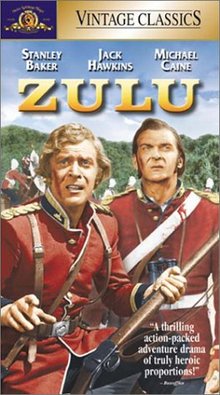| The second movie in the series for the boys was the classic “Zulu“, starring a very slender Michael Caine in, I think, his first movie. It’s based on the true story of barely 100 British soldier’s standing alone against some 10,000 Zulu warriors in the battle of Roark’s Drift the day after a much larger British force had been wiped out by the same Zulu army.
I selected this movie for the boys not only because it is an example of courage in the face of great odds, but because it shows the value of discipline as preparation for unseen and unknown challenges in the future. |
 |
While there are many real life stories of heroes rising to the occasion on a moment’s notice, many times this is possible because the “hero” has spent considerable time learning to master his/her fear and will. In this movie both sides show a tremendous amount of discipline under great stress and in the face of carnage. Additionally this is an interesting examination of the way prejudice and disrespect is reflected not only between races, but even within the same race and society.
Here are the key points I wanted the young men to get out of this movie and ensuing discussion:
Courage and discipline in the face of extreme odds can carry the day.
The power of words to both encourage and discourage.
The importance of training and discipline, combined with character and courage, in making it possible to rise to an occasion when called upon.
Overcoming differences in order to work together for success.
Courage and tenacity will win the respect of your enemy.
Complaining when you find yourself in a tough situation isn’t going to help you resolve that situation.
The questions:
- Was Rev. Witt’s use of scripture appropriate? Why or why not?
- How did each army demonstrate discipline?
- How many forms of prejudice were demonstrated in the movie?
- Why did Lt. Bromhead say at one point that he wished he “were not an officer and a gentleman?”
- What was the nature of the relationship between Sgt. Maxfield (the sick man in the infirmary) and Private Hook? Why did each behave as he did?
- The way Color Sergeant Bourne conducted himself hardly changed regardless of what was happening around him. Why do you think he was so unflappable?
Great Quotes:
Chard: “Hold our ground? What military genius came up with that? Someone’s son and heir who got his commission before he could shave?”
Bromhead: “I rather expect he’s no one’s son and heir now.”
Bromhead: “When you assume command, Old Boy, you’re on your own.”
Soldier: “Why us?”
Color Sergeant Vaughn: “Because we’re here lad. No one else. Just us.”












Yep, an amazing story, and a durn good movie
I’m going to have to start sneaking into your screenings. Zulu is one of my favorites of all time.
I love the scene where they start singing “Welshmen will not yield,” back at the Zulu battle song. Did any of your kids mention that?
Actually, we did spend some time talking about the power of song to encourage and inspire – whether in a praise and worship service or a marching band at a football game.
Oh, and Doug, what number “Williams” are you?
Not sure I get the question about “what number”? Do you mean, as in, the way they number them in the credits of the movie? Or something else?
Being a Welsh regiment, there were a number of Williamses on the roll and the troops were called out as “Williams, 157”, etc a couple of times in dialog in the movie and when CS Vaughn called the roll after the battle – a lame joke on my part, but I thought you’d catch the reference.
I sort of caught it, and sort of didn’t. I wondered if you were being more obscure than that. And besides… I’m #1 and assumed that was obvious.